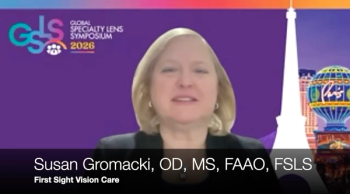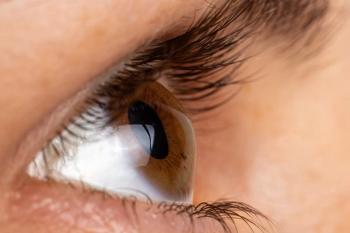
VEW 2022: Laser therapy and advanced procedures are changing the scope of optometry
Nate Lighthizer, OD, FAAO, shares key takeaways from his VEW 2022 presentation, "Laser therapy and advanced procedures."
Nate Lighthizer, OD, FAAO, professor and associate dean of NSU Oklahoma College of Optometry and president of the Intrepid Eye Society, as well as the director of Continuing Education and the chief of Specialty Care Clinics, sat down with Optometry Times® editor Kassi Jackson to share hightlights from his presentation, "Laser therapy and advanced procedures," which he presented during this year's Vision Expo West in Las Vegas.
This transcript has been lightly edited for clarity:
Jackson:
Hi everyone, I'm joined today by Dr. Nate Lighthizer, known as Dr. Nate, who is professor and associate dean of NSU Oklahoma College of Optometry and president of the Interpret Eye Society. He's here to share highlights from his discussion titled, "Laser therapy and advanced procedures," which he is presenting during this year's Vision Expo West in Las Vegas. Thank you for being here. Dr. Nate.
Lighthizer:
Thanks for having me; appreciate it very much.
Jackson:
Would you please share with us the key highlights from your presentation?
Lighthizer:
It was a video grand rounds presentation where we discussed a variety of different procedures that optometrists can do in-office from laser therapy, to injections, to surgical procedures like ocular lesion removal, in-office repair of entropion, things like that.
So as a video grand rounds, when I do this lecture, I often I leave it up to the the audience and say, "What do you guys wanted to talk about?" I put up an opening slide and say, "Here's all the topics that we could discuss in this video grand rounds, and we will spend as long or as short on each of these topics that you would like."
And again, topics would be laser therapy, like SLT or YAG laser capsulotomy, or laser peripheral iridotomy, or laser floater removal; injections, maybe it's a kenalog injection...maybe it's an injection of an anesthetic agent to numb up a lesion; or all we know is a lump or bump on the eyelids, so then it's removed with a surgical scissors or a scalpel or radiofrequency device. So a variety of different topics.
The key take home points of what we discussed are just going to be how do you do this procedure. And that's obviously when they're watching a video, you can see the procedural techniques, but we also discussed preop considerations, postop considerations, indications, contraindications, things to look at in the postoperative period for potential complications, things like that.
We covered a wide variety of things, even though it's just videos, because I think doctors really like watching those videos. But we pause numerous times and said, "Okay, here's how you do this. But remember about this, the preop, the postop, etc." So we get a lot of different conditions and a lot of different videos during our laser therapy and advanced procedures talk.
Jackson:
Why is this so important to discuss?
Lighthizer:
Yeah, I think this is important to discuss because it's really a hot topic in optometry right now.
There's currently 10 states that allow optometrists to do anterior segment laser procedures. 12 years ago, there was 1. So now there is an additional 9. So we've got 10 states and an 11th state that is very close as we talk right now. So it's a hot topic right now of optometry diving into the surgical realm, the laser realm, basically, in-office procedures.
As you know, optometry has really evolved over the course of the last 10, 20, 30, 40, 50 years, from a profession that's added diagnostic drops, added therapeutic drops, added oral medications, and really the over the last five to 10-15 years, it's been office-based procedures: things that we're not going to the OR, but we're doing these procedures in-office, again, like laser procedures, injections, little office-based procedures, as well.
So it's a hot topic and scope expansion is happening across numerous areas, numerous states in the United States.
Jackson:
What does that expansion mean for patients?
Lighthizer:
That's the ultimate purpose for it. The rationale for it is increased access to high-quality eye care.
Optometric education and training has evolved tremendously over the past few decades, technology has has evolved over the past few decades. And with this training, and with this education, it's imperative for optometrists to deploy that, to practice to the highest level of their training and education. And when they do that, there's better access to patients.
I can't tell you the number of stories I've heard from across the country, from doctors, on patients that were so happy that their doctor—they've been seeing that doctor for years and decades—can now do a procedure in their office and take care of them without a referral out that may take months to get, maybe an hour or 2 away.
So helping patients locally by high quality doctors has been a win for patients.
Jackson:
What do you hope the audience took away from this conversation?
Lighthizer:
I hope they took away that hey, you know, optometry is changing. Optometry is evolving. That's a good thing. The more tools that we have in our toolbox, the better.
I always tell doctors, are you glad you could treat a red eye? Are you glad you can treat glaucoma? It wasn't always that way 40-50 years ago, and the answer is always yes. We're glad that we can do that. And we're glad that optometrists are successfully performing laser procedures, injections, etc.
So I hope they took away going, "Oooh, optometry is evolving, it's advancing, it's expanding its scope, and I may be interested in doing this down the road. I may not be doing it now because the state doesn't allow it, but who knows what will be coming 5-10 or years from now or even sooner?"
It's an exciting time in optometry.
Newsletter
Want more insights like this? Subscribe to Optometry Times and get clinical pearls and practice tips delivered straight to your inbox.














































